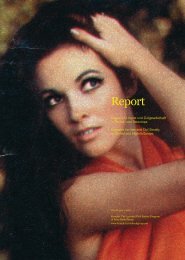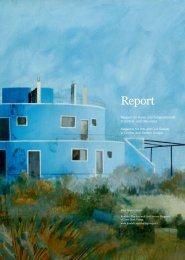Report_Issue 1/2009 - Jubiläum/ 20 Jahre Mauerfall
Report_Issue 1/2009 - Jubiläum/ 20 Jahre Mauerfall
Report_Issue 1/2009 - Jubiläum/ 20 Jahre Mauerfall
Erfolgreiche ePaper selbst erstellen
Machen Sie aus Ihren PDF Publikationen ein blätterbares Flipbook mit unserer einzigartigen Google optimierten e-Paper Software.
Full in<br />
the<br />
world,<br />
full in faith<br />
Svatopluk Karasek, who was born in Prague in 1942, was a Protestant pastor before he joined the wild<br />
Underground movement in the early 1970s and started to preach rock. He was forbidden to practice his<br />
profession, imprisoned and subsequently he emigrated to Switzerland. He has lived again in Prague for<br />
some time now and since <strong>20</strong>04 has been the human rights commissioner of the Czech government.<br />
— Sebastian Fasthuber talks to Svatopluk Karasek —<br />
Sebastian Fasthuber: Let's go back a couple of decades. In the Czechoslovakia<br />
of the 1970s Underground meant something far more radical<br />
than in the West. Longhaired people and rockers were persecuted by the<br />
police and could only live the way they wanted in secret. How do you look<br />
back on this period?<br />
Svatopluk Karasek: Perhaps I should explain Underground in contrast<br />
to the present. Present day life creates lifeless situations. Today you can<br />
have everything and don't even have to leave your house to get it. Everything<br />
works better but somehow or other life seems flat. Something alive,<br />
something authentic occurs only rarely. With the Underground things<br />
were different. Young people sensed the oppression of Communism and<br />
looked for something that would allow them to live fully. Underground<br />
was art without fees, just for pure joy. Everybody did something or other<br />
and we performed after each other on small stages, in the great outdoors<br />
or in barns. Professors who were no longer allowed to teach gave lectures<br />
from forbidden books. It was a time that was intensely alive.<br />
That all sounds very idyllic. But you were constantly on the run and in<br />
1976 you were even imprisoned for a few months.<br />
Yes I was locked up for eight months. What made it bearable was the solidarity.<br />
In the 1950s people were also regularly imprisoned. But at that<br />
time nobody showed any interest in them. In our case people defended<br />
themselves for the first time. Václav Havel played an important role, other<br />
artists and the Church also helped. Ultimately it was the involvement<br />
of these people that led to me and a number of other detainees being<br />
released from remand in 1976. Charta 77 developed out of this solidarity<br />
in January 1977. I was one of the first to sign it. The disadvantage of the<br />
Charta was that afterwards we were paid constant visits by the secret police.<br />
I was imprisoned on remand eleven further times. I was persecuted<br />
for three years and my family suffered intensely.<br />
Underground rocker and pastor, that seems like something of a contradiction.<br />
But religiousness was a kind of protest in Czechoslovakia at that<br />
time, wasn't it?<br />
Exactly. The communist regime wanted to exterminate the Church and<br />
religious belief. We were an opposition movement. I studied theology<br />
and took it very seriously, as I am deeply religious. But on the other hand<br />
I never lost contact with those of my friends who do not share my faith. I<br />
remain in the world, full in the world, full in faith.<br />
After the collapse of Communism you went straight back to your native<br />
country?<br />
I had to, even though it was hard for my family. We Underground people<br />
had believed that this system was installed for all time. That it would end<br />
sometime was inconceivable to us. Suddenly we had the chance to build<br />
up something new.<br />
What has remained of this feeling of building up something new?<br />
I think that in the Czech Republic today we have a completely normal development.<br />
We should reflect more often on the freedoms we enjoy. Many<br />
people take them far too much for granted. I still rejoice when I can sing<br />
and preach. However, it must be said that in earlier times most people did<br />
not feel their lack of freedom. Perhaps a few hundred people were actively<br />
involved in the Underground. But you see what can develop and how much<br />
can be changed when you commit yourself completely to something.<br />
Sebastian Fasthuber works as a freelance music and literature critic.<br />
The full interview appeared in “<strong>Report</strong>” in August <strong>20</strong>06 (online).<br />
73




